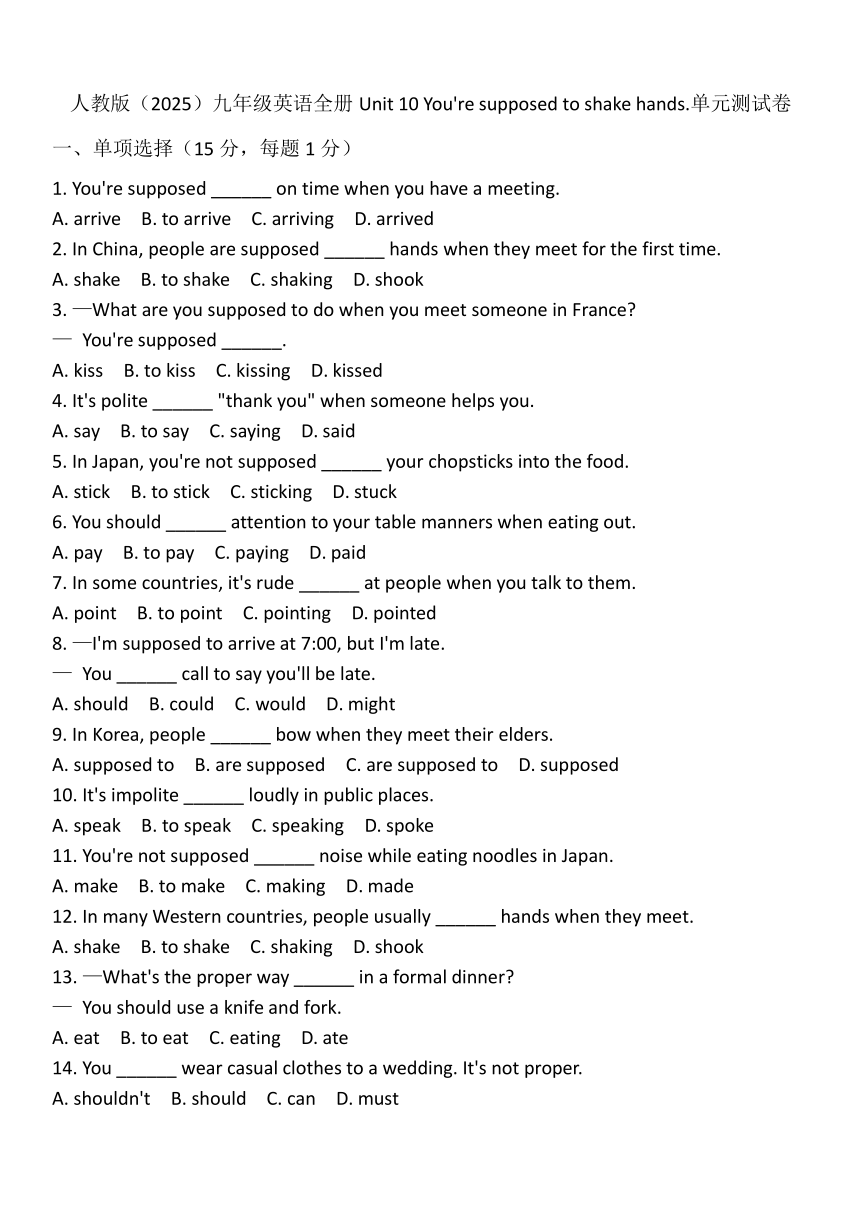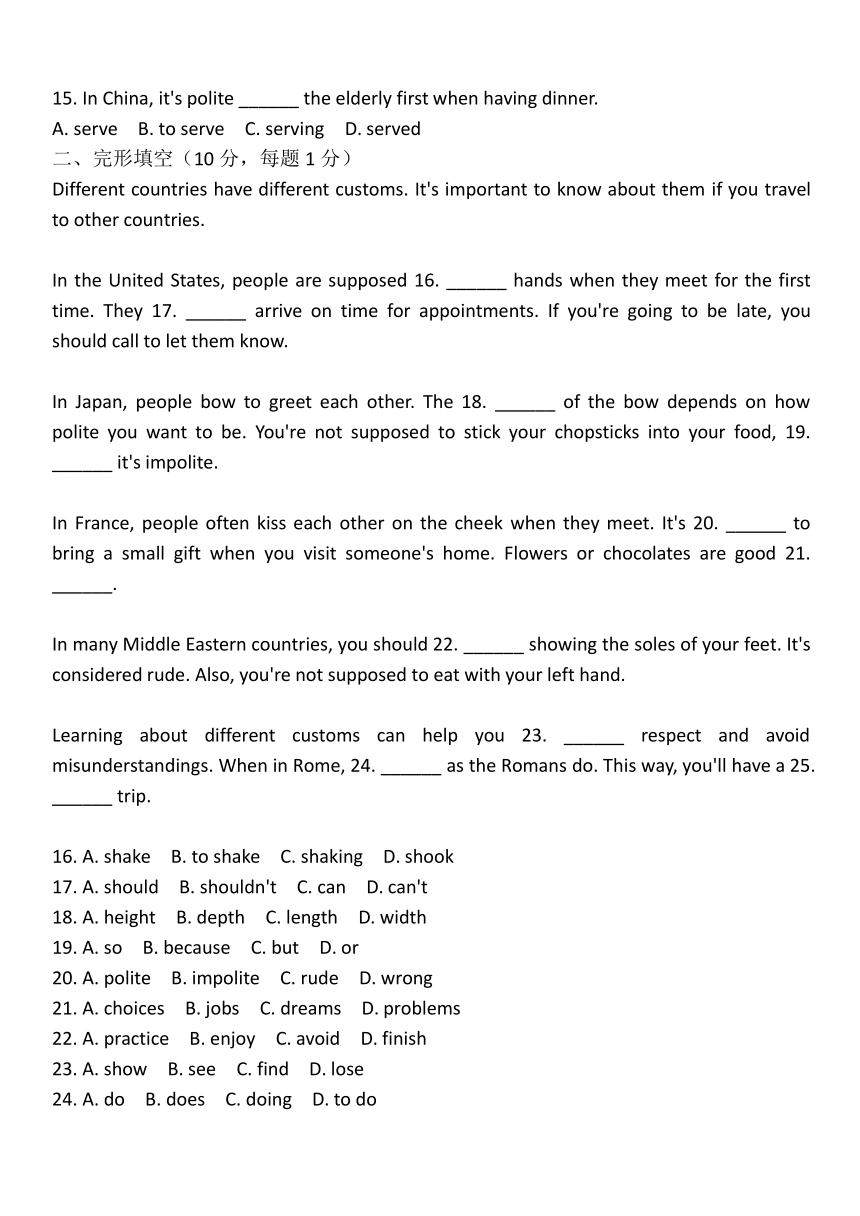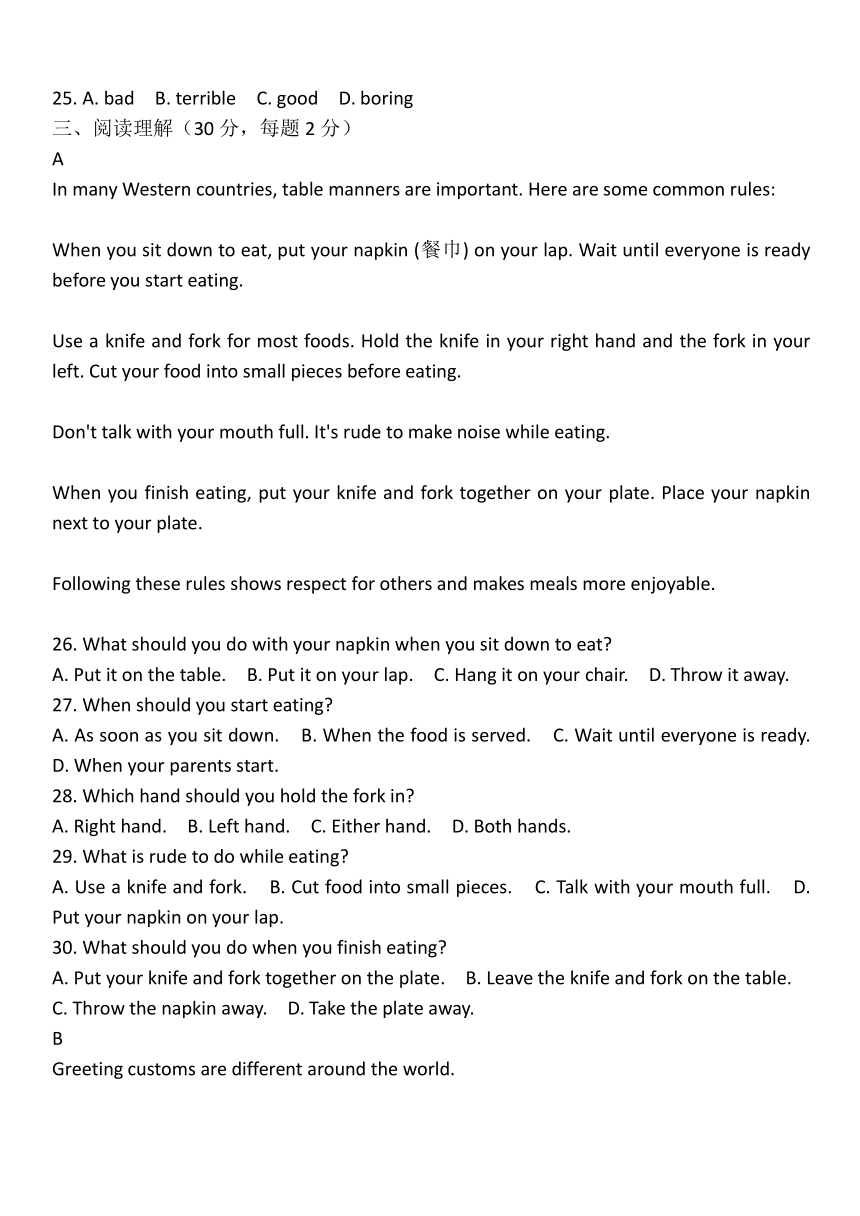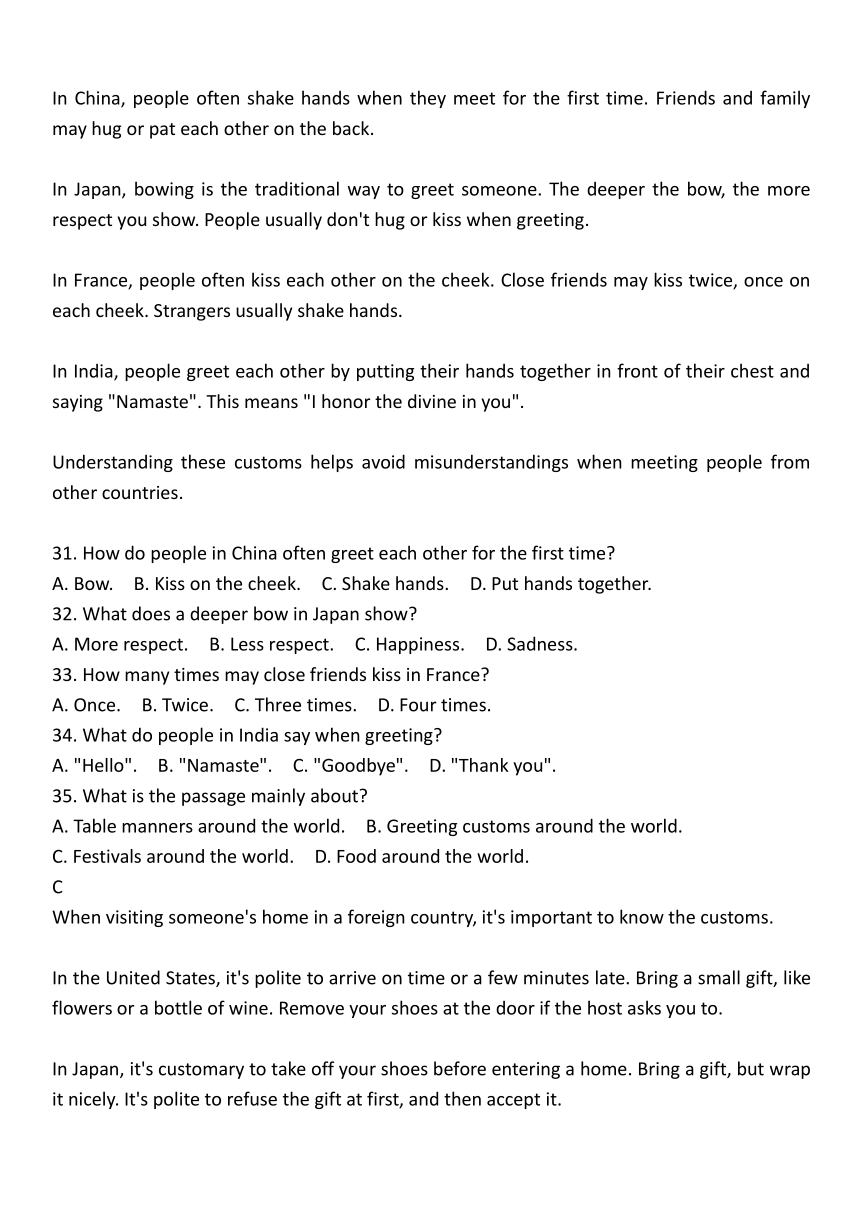Unit 10 You're supposed to shake hands. 单元测试卷(含答案) -2025-2026学年 人教版(2012)九年级英语全册
文档属性
| 名称 | Unit 10 You're supposed to shake hands. 单元测试卷(含答案) -2025-2026学年 人教版(2012)九年级英语全册 |  | |
| 格式 | docx | ||
| 文件大小 | 30.8KB | ||
| 资源类型 | 教案 | ||
| 版本资源 | 人教新目标(Go for it)版 | ||
| 科目 | 英语 | ||
| 更新时间 | 2025-07-17 11:07:08 | ||
图片预览




文档简介
人教版(2025)九年级英语全册Unit 10 You're supposed to shake hands.单元测试卷
一、单项选择(15分,每题1分)
1. You're supposed ______ on time when you have a meeting.
A. arrive B. to arrive C. arriving D. arrived
2. In China, people are supposed ______ hands when they meet for the first time.
A. shake B. to shake C. shaking D. shook
3. —What are you supposed to do when you meet someone in France
— You're supposed ______.
A. kiss B. to kiss C. kissing D. kissed
4. It's polite ______ "thank you" when someone helps you.
A. say B. to say C. saying D. said
5. In Japan, you're not supposed ______ your chopsticks into the food.
A. stick B. to stick C. sticking D. stuck
6. You should ______ attention to your table manners when eating out.
A. pay B. to pay C. paying D. paid
7. In some countries, it's rude ______ at people when you talk to them.
A. point B. to point C. pointing D. pointed
8. —I'm supposed to arrive at 7:00, but I'm late.
— You ______ call to say you'll be late.
A. should B. could C. would D. might
9. In Korea, people ______ bow when they meet their elders.
A. supposed to B. are supposed C. are supposed to D. supposed
10. It's impolite ______ loudly in public places.
A. speak B. to speak C. speaking D. spoke
11. You're not supposed ______ noise while eating noodles in Japan.
A. make B. to make C. making D. made
12. In many Western countries, people usually ______ hands when they meet.
A. shake B. to shake C. shaking D. shook
13. —What's the proper way ______ in a formal dinner
— You should use a knife and fork.
A. eat B. to eat C. eating D. ate
14. You ______ wear casual clothes to a wedding. It's not proper.
A. shouldn't B. should C. can D. must
15. In China, it's polite ______ the elderly first when having dinner.
A. serve B. to serve C. serving D. served
二、完形填空(10分,每题1分)
Different countries have different customs. It's important to know about them if you travel to other countries.
In the United States, people are supposed 16. ______ hands when they meet for the first time. They 17. ______ arrive on time for appointments. If you're going to be late, you should call to let them know.
In Japan, people bow to greet each other. The 18. ______ of the bow depends on how polite you want to be. You're not supposed to stick your chopsticks into your food, 19. ______ it's impolite.
In France, people often kiss each other on the cheek when they meet. It's 20. ______ to bring a small gift when you visit someone's home. Flowers or chocolates are good 21. ______.
In many Middle Eastern countries, you should 22. ______ showing the soles of your feet. It's considered rude. Also, you're not supposed to eat with your left hand.
Learning about different customs can help you 23. ______ respect and avoid misunderstandings. When in Rome, 24. ______ as the Romans do. This way, you'll have a 25. ______ trip.
16. A. shake B. to shake C. shaking D. shook
17. A. should B. shouldn't C. can D. can't
18. A. height B. depth C. length D. width
19. A. so B. because C. but D. or
20. A. polite B. impolite C. rude D. wrong
21. A. choices B. jobs C. dreams D. problems
22. A. practice B. enjoy C. avoid D. finish
23. A. show B. see C. find D. lose
24. A. do B. does C. doing D. to do
25. A. bad B. terrible C. good D. boring
三、阅读理解(30分,每题2分)
A
In many Western countries, table manners are important. Here are some common rules:
When you sit down to eat, put your napkin (餐巾) on your lap. Wait until everyone is ready before you start eating.
Use a knife and fork for most foods. Hold the knife in your right hand and the fork in your left. Cut your food into small pieces before eating.
Don't talk with your mouth full. It's rude to make noise while eating.
When you finish eating, put your knife and fork together on your plate. Place your napkin next to your plate.
Following these rules shows respect for others and makes meals more enjoyable.
26. What should you do with your napkin when you sit down to eat
A. Put it on the table. B. Put it on your lap. C. Hang it on your chair. D. Throw it away.
27. When should you start eating
A. As soon as you sit down. B. When the food is served. C. Wait until everyone is ready. D. When your parents start.
28. Which hand should you hold the fork in
A. Right hand. B. Left hand. C. Either hand. D. Both hands.
29. What is rude to do while eating
A. Use a knife and fork. B. Cut food into small pieces. C. Talk with your mouth full. D. Put your napkin on your lap.
30. What should you do when you finish eating
A. Put your knife and fork together on the plate. B. Leave the knife and fork on the table.
C. Throw the napkin away. D. Take the plate away.
B
Greeting customs are different around the world.
In China, people often shake hands when they meet for the first time. Friends and family may hug or pat each other on the back.
In Japan, bowing is the traditional way to greet someone. The deeper the bow, the more respect you show. People usually don't hug or kiss when greeting.
In France, people often kiss each other on the cheek. Close friends may kiss twice, once on each cheek. Strangers usually shake hands.
In India, people greet each other by putting their hands together in front of their chest and saying "Namaste". This means "I honor the divine in you".
Understanding these customs helps avoid misunderstandings when meeting people from other countries.
31. How do people in China often greet each other for the first time
A. Bow. B. Kiss on the cheek. C. Shake hands. D. Put hands together.
32. What does a deeper bow in Japan show
A. More respect. B. Less respect. C. Happiness. D. Sadness.
33. How many times may close friends kiss in France
A. Once. B. Twice. C. Three times. D. Four times.
34. What do people in India say when greeting
A. "Hello". B. "Namaste". C. "Goodbye". D. "Thank you".
35. What is the passage mainly about
A. Table manners around the world. B. Greeting customs around the world.
C. Festivals around the world. D. Food around the world.
C
When visiting someone's home in a foreign country, it's important to know the customs.
In the United States, it's polite to arrive on time or a few minutes late. Bring a small gift, like flowers or a bottle of wine. Remove your shoes at the door if the host asks you to.
In Japan, it's customary to take off your shoes before entering a home. Bring a gift, but wrap it nicely. It's polite to refuse the gift at first, and then accept it.
In Saudi Arabia, it's important to dress modestly (端庄地). Men should wear long pants, and women should cover their shoulders and knees. Don't bring alcohol (酒) as a gift—it's not allowed.
Following these customs helps you make a good impression.
36. What is polite to do when visiting someone in the US
A. Arrive very early. B. Arrive on time or a few minutes late.
C. Arrive an hour late. D. Don't arrive at all.
37. What should you do before entering a home in Japan
A. Take off your shoes. B. Put on a hat. C. Wash your hands. D. Bring food.
38. What should you do with a gift when visiting someone in Japan
A. Refuse it at first, then accept. B. Accept it immediately.
C. Throw it away. D. Give it to someone else.
39. How should you dress when visiting someone in Saudi Arabia
A. Wear shorts and a T-shirt. B. Dress modestly.
C. Wear a swimsuit. D. Wear whatever you like.
40. What shouldn't you bring as a gift to Saudi Arabia
A. Flowers. B. Chocolates. C. Alcohol. D. Books.
四、词汇运用(10分,每题1分)
(一)根据汉语或首字母提示填空(5分)
41. It's important to learn about different c______ (习俗) when traveling to other countries.
42. You're s______ (应该) to shake hands when meeting someone in China.
43. It's r______ (粗鲁的) to talk loudly in a library.
44. In Japan, bowing is a way to show r______ (尊重) to others.
45. You should pay a______ (注意) to your table manners when eating out.
(二)用所给词的适当形式填空(5分)
46. You're supposed ______ (arrive) on time for the meeting.
47. It's polite ______ (say) "thank you" when someone helps you.
48. In some countries, people like ______ (kiss) each other on the cheek.
49. You shouldn't ______ (point) at others with your finger.
50. He is used to ______ (bow) when meeting Japanese people.
五、句型转换(10分,每题2分)
51. You're supposed to shake hands in China.(对划线部分提问)
______ ______ you supposed to ______ in China
52. It's polite to knock before entering a room.(改为否定句)
It ______ ______ to knock before entering a room.
53. We should arrive early for the party.(改为同义句)
We ______ ______ to arrive early for the party.
54. You're not supposed to eat with your hands.(改为祈使句)
______ ______ with your hands.
55. In France, people are supposed to kiss when they meet.(对划线部分提问)
______ ______ people supposed to ______ when they meet in France
六、短文填空(10分,每题1分)
从方框中选择合适的单词,并用其适当形式填空,使短文完整、通顺。
Different countries have different 56. ______. When visiting a new country, it's important to know what you're 57. ______ to do.
In the US, people 58. ______ hands when they meet for the first time. It's 59. ______ to 60. ______ at others with your finger. You should 61. ______ on time for meetings.
In France, it's common to 62. ______ each other on the cheek when greeting. In Japan, bowing shows 63. ______ for others.
Paying 64. ______ to these small things can help you avoid being 65. ______ and make a good impression.
七、书面表达(15分)
请以 "Customs in China" 为题,写一篇英语短文,介绍中国的一些习俗,内容包括:见面时的礼仪、餐桌礼仪等,不少于80词。
__________________________________________________________________________________________________________________________________________________________________________________________________________________________________________________________________________________________________________________________________________________________________________________________________________________________________________________________________
答案
一、单项选择
1 - 5:B B B B B;6 - 10:A B A C B;11 - 15:B A B A B
二、完形填空
16 - 20:B A B B A;21 - 25:A C A A C
三、阅读理解
A篇:26 - 30:B C B C A;B篇:31 - 35:C A B B B;C篇:36 - 40:B A A B C
四、词汇运用
(一)41. customs;42. supposed;43. rude;44. respect;45. attention
(二)46. to arrive;47. to say;48. kissing;49. point;50. bowing
五、句型转换
51. What are;do;52. isn't polite;53. are supposed;54. Don't eat;55. What are;do
六、短文填空
56. customs;57. supposed;58. shake;59. rude;60. point;61. arrive;62. kiss;63. respect;64. attention;65. rude
七、书面表达(略)
一、单项选择(15分,每题1分)
1. You're supposed ______ on time when you have a meeting.
A. arrive B. to arrive C. arriving D. arrived
2. In China, people are supposed ______ hands when they meet for the first time.
A. shake B. to shake C. shaking D. shook
3. —What are you supposed to do when you meet someone in France
— You're supposed ______.
A. kiss B. to kiss C. kissing D. kissed
4. It's polite ______ "thank you" when someone helps you.
A. say B. to say C. saying D. said
5. In Japan, you're not supposed ______ your chopsticks into the food.
A. stick B. to stick C. sticking D. stuck
6. You should ______ attention to your table manners when eating out.
A. pay B. to pay C. paying D. paid
7. In some countries, it's rude ______ at people when you talk to them.
A. point B. to point C. pointing D. pointed
8. —I'm supposed to arrive at 7:00, but I'm late.
— You ______ call to say you'll be late.
A. should B. could C. would D. might
9. In Korea, people ______ bow when they meet their elders.
A. supposed to B. are supposed C. are supposed to D. supposed
10. It's impolite ______ loudly in public places.
A. speak B. to speak C. speaking D. spoke
11. You're not supposed ______ noise while eating noodles in Japan.
A. make B. to make C. making D. made
12. In many Western countries, people usually ______ hands when they meet.
A. shake B. to shake C. shaking D. shook
13. —What's the proper way ______ in a formal dinner
— You should use a knife and fork.
A. eat B. to eat C. eating D. ate
14. You ______ wear casual clothes to a wedding. It's not proper.
A. shouldn't B. should C. can D. must
15. In China, it's polite ______ the elderly first when having dinner.
A. serve B. to serve C. serving D. served
二、完形填空(10分,每题1分)
Different countries have different customs. It's important to know about them if you travel to other countries.
In the United States, people are supposed 16. ______ hands when they meet for the first time. They 17. ______ arrive on time for appointments. If you're going to be late, you should call to let them know.
In Japan, people bow to greet each other. The 18. ______ of the bow depends on how polite you want to be. You're not supposed to stick your chopsticks into your food, 19. ______ it's impolite.
In France, people often kiss each other on the cheek when they meet. It's 20. ______ to bring a small gift when you visit someone's home. Flowers or chocolates are good 21. ______.
In many Middle Eastern countries, you should 22. ______ showing the soles of your feet. It's considered rude. Also, you're not supposed to eat with your left hand.
Learning about different customs can help you 23. ______ respect and avoid misunderstandings. When in Rome, 24. ______ as the Romans do. This way, you'll have a 25. ______ trip.
16. A. shake B. to shake C. shaking D. shook
17. A. should B. shouldn't C. can D. can't
18. A. height B. depth C. length D. width
19. A. so B. because C. but D. or
20. A. polite B. impolite C. rude D. wrong
21. A. choices B. jobs C. dreams D. problems
22. A. practice B. enjoy C. avoid D. finish
23. A. show B. see C. find D. lose
24. A. do B. does C. doing D. to do
25. A. bad B. terrible C. good D. boring
三、阅读理解(30分,每题2分)
A
In many Western countries, table manners are important. Here are some common rules:
When you sit down to eat, put your napkin (餐巾) on your lap. Wait until everyone is ready before you start eating.
Use a knife and fork for most foods. Hold the knife in your right hand and the fork in your left. Cut your food into small pieces before eating.
Don't talk with your mouth full. It's rude to make noise while eating.
When you finish eating, put your knife and fork together on your plate. Place your napkin next to your plate.
Following these rules shows respect for others and makes meals more enjoyable.
26. What should you do with your napkin when you sit down to eat
A. Put it on the table. B. Put it on your lap. C. Hang it on your chair. D. Throw it away.
27. When should you start eating
A. As soon as you sit down. B. When the food is served. C. Wait until everyone is ready. D. When your parents start.
28. Which hand should you hold the fork in
A. Right hand. B. Left hand. C. Either hand. D. Both hands.
29. What is rude to do while eating
A. Use a knife and fork. B. Cut food into small pieces. C. Talk with your mouth full. D. Put your napkin on your lap.
30. What should you do when you finish eating
A. Put your knife and fork together on the plate. B. Leave the knife and fork on the table.
C. Throw the napkin away. D. Take the plate away.
B
Greeting customs are different around the world.
In China, people often shake hands when they meet for the first time. Friends and family may hug or pat each other on the back.
In Japan, bowing is the traditional way to greet someone. The deeper the bow, the more respect you show. People usually don't hug or kiss when greeting.
In France, people often kiss each other on the cheek. Close friends may kiss twice, once on each cheek. Strangers usually shake hands.
In India, people greet each other by putting their hands together in front of their chest and saying "Namaste". This means "I honor the divine in you".
Understanding these customs helps avoid misunderstandings when meeting people from other countries.
31. How do people in China often greet each other for the first time
A. Bow. B. Kiss on the cheek. C. Shake hands. D. Put hands together.
32. What does a deeper bow in Japan show
A. More respect. B. Less respect. C. Happiness. D. Sadness.
33. How many times may close friends kiss in France
A. Once. B. Twice. C. Three times. D. Four times.
34. What do people in India say when greeting
A. "Hello". B. "Namaste". C. "Goodbye". D. "Thank you".
35. What is the passage mainly about
A. Table manners around the world. B. Greeting customs around the world.
C. Festivals around the world. D. Food around the world.
C
When visiting someone's home in a foreign country, it's important to know the customs.
In the United States, it's polite to arrive on time or a few minutes late. Bring a small gift, like flowers or a bottle of wine. Remove your shoes at the door if the host asks you to.
In Japan, it's customary to take off your shoes before entering a home. Bring a gift, but wrap it nicely. It's polite to refuse the gift at first, and then accept it.
In Saudi Arabia, it's important to dress modestly (端庄地). Men should wear long pants, and women should cover their shoulders and knees. Don't bring alcohol (酒) as a gift—it's not allowed.
Following these customs helps you make a good impression.
36. What is polite to do when visiting someone in the US
A. Arrive very early. B. Arrive on time or a few minutes late.
C. Arrive an hour late. D. Don't arrive at all.
37. What should you do before entering a home in Japan
A. Take off your shoes. B. Put on a hat. C. Wash your hands. D. Bring food.
38. What should you do with a gift when visiting someone in Japan
A. Refuse it at first, then accept. B. Accept it immediately.
C. Throw it away. D. Give it to someone else.
39. How should you dress when visiting someone in Saudi Arabia
A. Wear shorts and a T-shirt. B. Dress modestly.
C. Wear a swimsuit. D. Wear whatever you like.
40. What shouldn't you bring as a gift to Saudi Arabia
A. Flowers. B. Chocolates. C. Alcohol. D. Books.
四、词汇运用(10分,每题1分)
(一)根据汉语或首字母提示填空(5分)
41. It's important to learn about different c______ (习俗) when traveling to other countries.
42. You're s______ (应该) to shake hands when meeting someone in China.
43. It's r______ (粗鲁的) to talk loudly in a library.
44. In Japan, bowing is a way to show r______ (尊重) to others.
45. You should pay a______ (注意) to your table manners when eating out.
(二)用所给词的适当形式填空(5分)
46. You're supposed ______ (arrive) on time for the meeting.
47. It's polite ______ (say) "thank you" when someone helps you.
48. In some countries, people like ______ (kiss) each other on the cheek.
49. You shouldn't ______ (point) at others with your finger.
50. He is used to ______ (bow) when meeting Japanese people.
五、句型转换(10分,每题2分)
51. You're supposed to shake hands in China.(对划线部分提问)
______ ______ you supposed to ______ in China
52. It's polite to knock before entering a room.(改为否定句)
It ______ ______ to knock before entering a room.
53. We should arrive early for the party.(改为同义句)
We ______ ______ to arrive early for the party.
54. You're not supposed to eat with your hands.(改为祈使句)
______ ______ with your hands.
55. In France, people are supposed to kiss when they meet.(对划线部分提问)
______ ______ people supposed to ______ when they meet in France
六、短文填空(10分,每题1分)
从方框中选择合适的单词,并用其适当形式填空,使短文完整、通顺。
Different countries have different 56. ______. When visiting a new country, it's important to know what you're 57. ______ to do.
In the US, people 58. ______ hands when they meet for the first time. It's 59. ______ to 60. ______ at others with your finger. You should 61. ______ on time for meetings.
In France, it's common to 62. ______ each other on the cheek when greeting. In Japan, bowing shows 63. ______ for others.
Paying 64. ______ to these small things can help you avoid being 65. ______ and make a good impression.
七、书面表达(15分)
请以 "Customs in China" 为题,写一篇英语短文,介绍中国的一些习俗,内容包括:见面时的礼仪、餐桌礼仪等,不少于80词。
__________________________________________________________________________________________________________________________________________________________________________________________________________________________________________________________________________________________________________________________________________________________________________________________________________________________________________________________________
答案
一、单项选择
1 - 5:B B B B B;6 - 10:A B A C B;11 - 15:B A B A B
二、完形填空
16 - 20:B A B B A;21 - 25:A C A A C
三、阅读理解
A篇:26 - 30:B C B C A;B篇:31 - 35:C A B B B;C篇:36 - 40:B A A B C
四、词汇运用
(一)41. customs;42. supposed;43. rude;44. respect;45. attention
(二)46. to arrive;47. to say;48. kissing;49. point;50. bowing
五、句型转换
51. What are;do;52. isn't polite;53. are supposed;54. Don't eat;55. What are;do
六、短文填空
56. customs;57. supposed;58. shake;59. rude;60. point;61. arrive;62. kiss;63. respect;64. attention;65. rude
七、书面表达(略)
同课章节目录
- Unit 1 How can we become good learners.
- Section A
- Section B
- Unit 2 I think that mooncakes are delicious!
- Section A
- Section B
- Unit 3 Could you please tell me where the restroom
- Section A
- Section B
- Unit 4 I used to be afraid of the dark.
- Section A
- Section B
- Unit 5 What are the shirts made of?
- Section A
- Section B
- Review of Units 1-5
- Unit 6 When was it invented?
- Section A
- Section B
- Unit 7 Teenagers should be allowed to choose their
- Section A
- Section B
- Unit 8 It must belong to Carla.
- Section A
- Section B
- Unit 9 I like music that I can dance to.
- Section A
- Section B
- Unit 10 You're supposed to shake hands.
- Section A
- Section B
- Review of Units 6-10
- Unit 11 Sad movies make me cry.
- Section A
- Section B
- Unit 12 Life is full of the unexpected
- Section A
- Section B
- Unit 13 We're trying to save the earth!
- Section A
- Section B
- Unit 14 I remember meeting all of you in Grade 7.
- Section A
- Section B
- Review of Units 11-14
